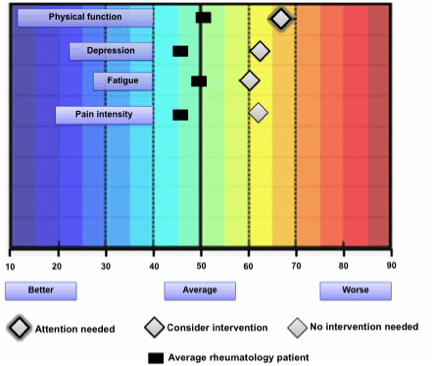Session Information
Title: Health Services Research, Quality Measures and Quality of Care - Innovations in Health Care Delivery
Session Type: Abstract Submissions (ACR)
Background/Purpose: The National Institutes of Health Patient Reported Outcomes Measurement Information System (PROMIS¨) roadmap initiative is a cooperative research program designed to develop, evaluate, and standardize item banks to measure patient-reported outcomes (PROs) across different medical conditions as well as the US population (www.nihpromis.org). It has comprehensive items banks that assess physical, mental, and social well-being. The aim of this study was to assess the interpretation of PROMIS report by rheumatologists at the University of Michigan (UM) Hospital.
Methods: Four focus group discussions consisting of eleven rheumatologists were held at UM Health System. The panelists were first presented with an overview of PROMIS process followed by a series of patient reports With a focus on the evaluating which report was feasible to use in day-to-day practice and clinically meaningful, the following questions were asked by: (i) What do you think of this report? (ii) Do you understand what this report is communicating? (iii) Is there anything you would change about this report to make this better?
Results: All the rheumatologists agreed on the following suggestions: (i) Representation of the item scores as thermal graphs or “heat map” was easier to interpret (ii) Provide average scores for the U.S. population and rheumatology patients, (iii) Provide both average and percentile scores, and (iv) Provide pictorial depiction of most bothersome symptom and urgency for referral. Based on these discussions, we modified the PROMIS heat map (Figure 1) to include: (i) average scores for rheumatologic disorders (bold square), (ii), an open diamond to indicate the individual scores of the patients, and (iii) thickness of the diamond indicates the severity of these symptoms in the patient with an urgency for intervention (thicker equates to greater urgency).
Conclusion: This presents the first step to assess feasibility of incorporating PRO in rheumatology practice at UM. The PROMIS report card when integrated with the electronic medical record can contribute towards meaningful use. It may improve patient satisfaction and physician-patient relationship. Our long-term goal is to integrate PROMIS into a busy academic practice and assess its effectiveness.
Figure 1: Format of PROMIS report after incorporating the suggestions
Disclosure:
V. Nagaraja,
None;
D. A. Fox,
None;
S. Francis,
None;
O. Singer,
None;
P. Khanna,
None;
T. Laing,
None;
R. Marks,
None;
S. U. Monrad,
None;
V. M. Ognenovski,
None;
K. Phillips,
None;
D. Khanna,
NIH/NIAMS FUNDING,
2.
« Back to 2013 ACR/ARHP Annual Meeting
ACR Meeting Abstracts - https://acrabstracts.org/abstract/interpretation-of-patient-reported-outcomes-measurement-information-system-promis-by-rheumatologists/

